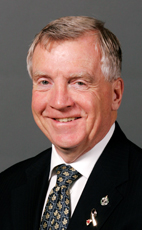Mr. Speaker, I would like to thank my colleague from Jeanne-Le Ber for his contribution to this important debate. I would like to respond to his statements.
I rise in response to the question and I may not be the correct parliamentary secretary, but I will have to do.
I would like to highlight that the government recognizes the impact that illicit tobacco manufacturing sales have on Canada's economic security and on the health of Canadians. Tackling crime and ensuring Canadians' health is a high priority for our government. We are committed to keeping Canadians safe, including safe from illegal activity such as the tobacco trade.
While many people fail to recognize the sale of contraband tobacco as a serious crime, it can have a significant impact on economic security and public safety including public health.
We have taken several measures to help address the issues of contraband tobacco. At the border, and not just the border, we have begun arming border services officers and hiring an additional 400 border services guards. We have invested $19.5 million in the RCMP integrated border enforcement teams strategically located along the border to disrupt cross border smuggling.
There is also activity with local police services in the communities. In fact, with funding from the 2006 budget the RCMP is adding another 70 customs and excise members between now and 2010. These new RCMP members will be strategically deployed to enhance enforcement of cross border crime including tobacco smuggling and illegal tobacco operations elsewhere. We have also increased audits of tobacco manufacturers and growers.
The RCMP conducts a wide array of enforcement activities to combat contraband tobacco in close cooperation with first nations police services, where a lot of the problem resides, the Canada Border Services Agency, as well as other domestic and U.S. law enforcement agencies, not just at the border.
Canadian law enforcement agencies are working hard to combat the trade in illicit tobacco by reducing both their supply and demand.
In addition, under the federal tobacco control strategy, the RCMP and CBSA have dedicated intelligence analysts and officers to closely monitor the illicit tobacco market. This information helps develop a complete picture of the illicit tobacco trade and helps identify the highest priority threats.
As the House may know, demand for illegal cigarettes remains strong despite the health and safety risks of such products. The RCMP is aware that illicit trade in tobacco products in Canada stems from a variety of sources and closely monitors emerging trends in the manufacture and sale of illicit cigarettes. The RCMP is working in close collaboration with law enforcement agencies on both sides of the border and in the local communities to combat illicit tobacco trade and related crimes.
As a result seizure levels are currently at their highest level since the early 1990s and are a direct result of successful operations conducted across the country. In 2006 more than 500,000 cartons of illicit tobacco products were seized along with vehicles, goods and money.
The RCMP strategy outlines concrete actions that are being undertaken over the next three years. These include: collaborating with domestic and U.S. partners to interdict key criminals and seize their proceeds of crime through innovative cooperative law enforcement models, and heightening awareness about the public safety and health consequences of the illicit tobacco trade, whether cross border or in the local communities.
These collaborative measures taken by the RCMP, CBSA and domestic and U.S. partners are concrete actions to reduce the availability and the demand for contraband tobacco products.

